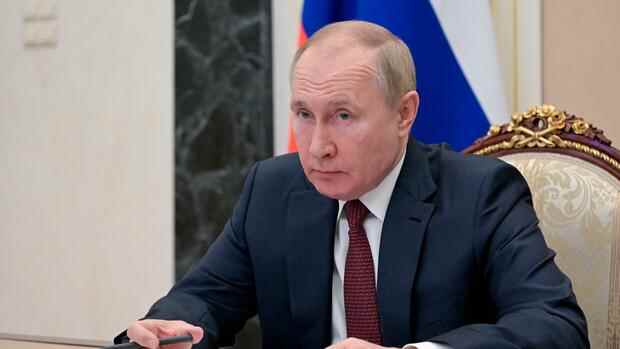Russia’s president sees himself threatened by the EU and NATO. Not militarily, but the ideas that came to Eastern Europe through the alliance made his position of power fluctuate.
(Photo: dpa)
Maintaining talks with Russia: This is the demand that has since become a phrase and which Germany likes to use to warn against an overly robust demeanor towards Moscow. It can be heard again now, almost every day. The efforts to resolve conflicts with the Kremlin through diplomatic channels have seldom been as great as these days.
An American-Russian meeting in Geneva on Monday was followed by the revival of the NATO-Russia Council in Brussels on Wednesday. Negotiations at the Organization for Security and Cooperation in Europe (OSCE) continued in Vienna on Thursday.
After the Russian threats against Ukraine, specifically: the deployment of troop units capable of invading the border area, the endeavor to reach an understanding with the Kremlin and to avert a war can be clearly seen. It is just as clear, however, that neither the US nor NATO can give Russia the security guarantees that the Kremlin is demanding.
In this context, the maximum demands to stop NATO’s eastward expansion, which the Russian side launched in recent weeks and which were recently excitedly discussed in Europe, are only one aspect. The problem is more fundamental and less military than political. After all, it is not the Western equipment of war that frightens Putin’s regime, but what the West stands for: the rule of law and democracy.
Top jobs of the day
Find the best jobs now and
be notified by email.
Putin does not have to fear a military attack from the West, he also knows that, but mass protests against his corrupt rule on Russian roads do. That is why the uprising in Kazakhstan alarmed the Kremlin so much. The core of the unrest had to be stifled, also with the help of Russian troops, to prevent them from spreading to Russia.
Putin sees his position of power in danger
The constant concern about one’s own position of rule is the real reason why Putin grants the former Soviet republics a limited amount of sovereignty and why Ukraine plays such a decisive role. A Ukraine that has freed itself from the grip of oligarchs, prospered and guaranteed civil rights, could tempt the Russian people to demand everything that Putin withheld from them: an independent judiciary, fair elections, the fight against kleptocracy and favoritism.
Of course, this also means that, from the Kremlin’s point of view, the EU is just as dangerous as NATO. It is no accident that Russia’s 2014 attack on Ukraine – the annexation of Crimea and the war in the Donbass region – followed an association agreement between Brussels and Kiev.
For this reason alone, the EU must insist that it be more closely involved in the talks between Russia and the USA. The fact that US negotiator Wendy Sherman also met top EU diplomat Stefano Sannino in Brussels on Wednesday is therefore an important sign.
Nobody should be blinded by Russian claims that Russia is facing an acute military threat. The “encirclement” by NATO is a propaganda invention.
Rather, the existence of the West poses a stability risk for the regime in Moscow. Russian military threats against neighboring countries, but also cyber and disinformation campaigns against trading partners like Germany can therefore be understood as forms of forward defense.
Post-Soviet oligarchic rule is in constant danger of being eroded from within. This feeds their aggressiveness to the outside world. The belief that with Putin’s Russia there could be a permanently viable security arrangement is therefore the central misunderstanding in the European defense debate.
More: Negotiating with the Russian aggressor – what does Putin want?
